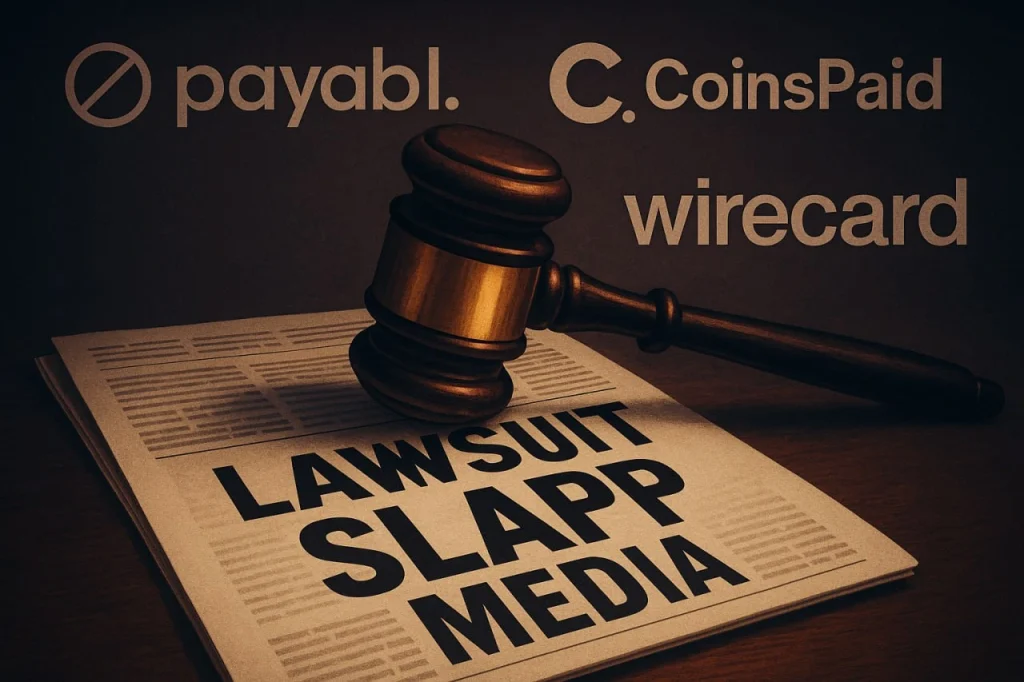Excerpt:
The Cypriot payment processor Payabl, founded by ex-Wirecard executives, is under scrutiny for its aggressive legal tactics against critical media. In a worrying parallel to the disgraced German fintech Wirecard, Payabl has joined forces with CoinsPaid in a SLAPP lawsuit against FinTelegram — allegedly based on forged documents. This strategic alliance, exposed in a recent FinTelegram investigation, raises serious concerns about both companies’ operational practices in the high-risk payment sector.
Key Points
- Payabl is co-founded by ex-Wirecard execs Dietmar Knoechelmann and Ruediger Trautmann and appears to mirror Wirecard’s business and media strategy.
- CoinsPaid and Payabl have joined forces in a SLAPP lawsuit against FinTelegram, allegedly using forged documents.
- Both firms focus on high-risk sectors like porn, gambling, online trading — just like Wirecard before its collapse.
- Payabl has threatened media outlets including Scam-Or with lawsuits, trying to scrub critical content from Google search results.
- The pattern of legal intimidation strongly suggests an attempt to silence scrutiny — a classic hallmark of companies with something to hide.
From Wirecard’s Ashes: The Rise of Payabl
Payabl was established by two key players in the Wirecard saga — Dietmar Knoechelmann and Ruediger Trautmann — who were among the top decision-makers during Wirecard’s explosive rise and catastrophic fall. Instead of distancing themselves from that legacy, they seem to have replicated the very same business model that once propped up Wirecard: high-risk merchants, shadowy partnerships, and aggressive retaliation against critics.
Payabl + CoinsPaid: A Dangerous Alliance?
According to FinTelegram’s latest report, Payabl is not only collaborating with CoinsPaid, a crypto payment processor, in delivering high-risk payment services, but also in waging legal warfare against independent media. Together, they filed a Strategic Lawsuit Against Public Participation (SLAPP) against FinTelegram — a textbook attempt to silence public interest journalism.
Even more disturbing, the lawsuit is allegedly built on forged documents, undermining the credibility and legality of the entire effort. The mere fact that Payabl and CoinsPaid are coordinating in such a high-stakes legal attack suggests a deeper operational alliance — potentially extending to their core business dealings.
Targeting the Press: Payabl’s War on Media
Wirecard’s executives famously went after journalists at the Financial Times, filing criminal complaints and attempting to discredit accurate reporting. Payabl now seems to be deploying the same playbook. Their legal representatives have contacted Scam-Or directly, issuing threats and attempting to have our content delisted from Google.
This chilling tactic is straight out of the Wirecard-era playbook and serves only to reinforce what many in the compliance community already suspect: Payabl, like Wirecard before it, may be hiding something.
Analysis: What Are They So Afraid Of?
If Payabl and CoinsPaid had nothing to conceal, they would openly address critical questions from journalists and compliance platforms. Instead, they deploy SLAPP tactics, legal threats, and forged documents — behaviors that strongly imply they are desperate to control the narrative and suppress scrutiny.
The real red flag isn’t just the lawsuit — it’s the coordinated, multi-pronged approach to silence watchdogs. This goes beyond corporate reputation management and enters the realm of deliberate intimidation and deception.
Scam-Or’s Position
At Scam-Or, we believe that truth stands up to scrutiny — and so should any legitimate business. We stand with FinTelegram and other investigative platforms committed to exposing financial misconduct. If Payabl and CoinsPaid are confident in their operations, they are welcome to respond transparently, not through threats and censorship.


